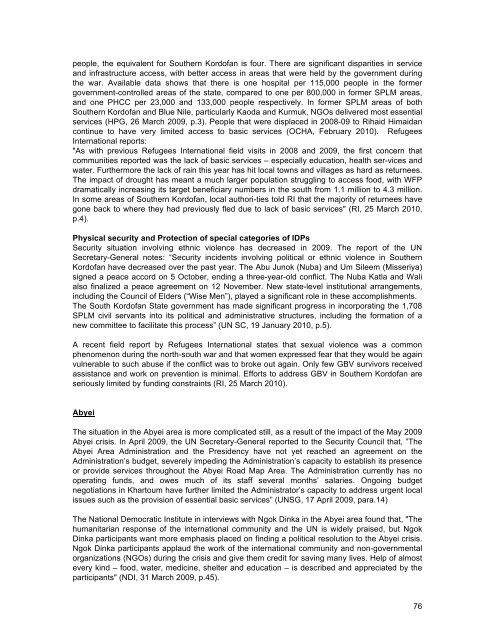SUDAN: Durable solutions elusive as southern IDPs return and ...
SUDAN: Durable solutions elusive as southern IDPs return and ...
SUDAN: Durable solutions elusive as southern IDPs return and ...
Create successful ePaper yourself
Turn your PDF publications into a flip-book with our unique Google optimized e-Paper software.
people, the equivalent for Southern Kordofan is four. There are significant disparities in service<br />
<strong>and</strong> infr<strong>as</strong>tructure access, with better access in are<strong>as</strong> that were held by the government during<br />
the war. Available data shows that there is one hospital per 115,000 people in the former<br />
government-controlled are<strong>as</strong> of the state, compared to one per 800,000 in former SPLM are<strong>as</strong>,<br />
<strong>and</strong> one PHCC per 23,000 <strong>and</strong> 133,000 people respectively. In former SPLM are<strong>as</strong> of both<br />
Southern Kordofan <strong>and</strong> Blue Nile, particularly Kaoda <strong>and</strong> Kurmuk, NGOs delivered most essential<br />
services (HPG, 26 March 2009, p.3). People that were displaced in 2008-09 to Rihaid Himaidan<br />
continue to have very limited access to b<strong>as</strong>ic services (OCHA, February 2010). Refugees<br />
International reports:<br />
"As with previous Refugees International field visits in 2008 <strong>and</strong> 2009, the first concern that<br />
communities reported w<strong>as</strong> the lack of b<strong>as</strong>ic services – especially education, health ser-vices <strong>and</strong><br />
water. Furthermore the lack of rain this year h<strong>as</strong> hit local towns <strong>and</strong> villages <strong>as</strong> hard <strong>as</strong> <strong>return</strong>ees.<br />
The impact of drought h<strong>as</strong> meant a much larger population struggling to access food, with WFP<br />
dramatically incre<strong>as</strong>ing its target beneficiary numbers in the south from 1.1 million to 4.3 million.<br />
In some are<strong>as</strong> of Southern Kordofan, local authori-ties told RI that the majority of <strong>return</strong>ees have<br />
gone back to where they had previously fled due to lack of b<strong>as</strong>ic services" (RI, 25 March 2010,<br />
p.4).<br />
Physical security <strong>and</strong> Protection of special categories of <strong>IDPs</strong><br />
Security situation involving ethnic violence h<strong>as</strong> decre<strong>as</strong>ed in 2009. The report of the UN<br />
Secretary-General notes: “Security incidents involving political or ethnic violence in Southern<br />
Kordofan have decre<strong>as</strong>ed over the p<strong>as</strong>t year. The Abu Junok (Nuba) <strong>and</strong> Um Sileem (Misseriya)<br />
signed a peace accord on 5 October, ending a three-year-old conflict. The Nuba Katla <strong>and</strong> Wali<br />
also finalized a peace agreement on 12 November. New state-level institutional arrangements,<br />
including the Council of Elders (“Wise Men”), played a significant role in these accomplishments.<br />
The South Kordofan State government h<strong>as</strong> made significant progress in incorporating the 1,708<br />
SPLM civil servants into its political <strong>and</strong> administrative structures, including the formation of a<br />
new committee to facilitate this process” (UN SC, 19 January 2010, p.5).<br />
A recent field report by Refugees International states that sexual violence w<strong>as</strong> a common<br />
phenomenon during the north-south war <strong>and</strong> that women expressed fear that they would be again<br />
vulnerable to such abuse if the conflict w<strong>as</strong> to broke out again. Only few GBV survivors received<br />
<strong>as</strong>sistance <strong>and</strong> work on prevention is minimal. Efforts to address GBV in Southern Kordofan are<br />
seriously limited by funding constraints (RI, 25 March 2010).<br />
Abyei<br />
The situation in the Abyei area is more complicated still, <strong>as</strong> a result of the impact of the May 2009<br />
Abyei crisis. In April 2009, the UN Secretary-General reported to the Security Council that, ”The<br />
Abyei Area Administration <strong>and</strong> the Presidency have not yet reached an agreement on the<br />
Administration’s budget, severely impeding the Administration’s capacity to establish its presence<br />
or provide services throughout the Abyei Road Map Area. The Administration currently h<strong>as</strong> no<br />
operating funds, <strong>and</strong> owes much of its staff several months’ salaries. Ongoing budget<br />
negotiations in Khartoum have further limited the Administrator’s capacity to address urgent local<br />
issues such <strong>as</strong> the provision of essential b<strong>as</strong>ic services” (UNSG, 17 April 2009, para.14)<br />
The National Democratic Institute in interviews with Ngok Dinka in the Abyei area found that, "The<br />
humanitarian response of the international community <strong>and</strong> the UN is widely praised, but Ngok<br />
Dinka participants want more emph<strong>as</strong>is placed on finding a political resolution to the Abyei crisis.<br />
Ngok Dinka participants applaud the work of the international community <strong>and</strong> non-governmental<br />
organizations (NGOs) during the crisis <strong>and</strong> give them credit for saving many lives. Help of almost<br />
every kind – food, water, medicine, shelter <strong>and</strong> education – is described <strong>and</strong> appreciated by the<br />
participants" (NDI, 31 March 2009, p.45).<br />
76
















